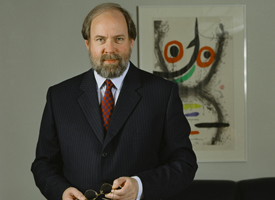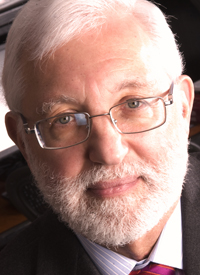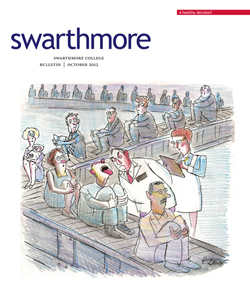Getting Down to Cases
Three Distinguished Jurists Weigh in on Their Most Momentous Decisions—Concerning Racism, Pornography, and Big-Bank Excesses
Asking federal judges to select their most outstanding case may be a bit like asking parents to single out their favorite child. For Mary Murphy Schroeder ’62, H’06, the choice was obvious—the righting of wartime wrongs against one courageous Japanese American remains clearly “the case of a lifetime.”
Not so for Frank Easterbrook ’70, H’12. A leading legal scholar in corporate law, antitrust law, and the economic analysis of law, Easterbrook, who did honors economics and political science at Swarthmore, decided to go with a major First Amendment case.
Jed Rakoff ’64, H’03, whose decisions frequently make the front page of The New York Times, has laid down the law from antiquities theft to insider trading. His personal fave is his decision declaring the federal death-penalty statute unconstitutional (it was reversed). But with the continuing revelations of dubious dealings by banks, he went with his decision involving the SEC and Bank of America.
First Case, Please.
Gordon K. Hirabayashi v. United States of America, U.S. Court of Appeals for the Ninth Circuit—Opinion by Judge Mary Murphy Schroeder
U.S. Court of Appeals Judge Schroeder’s reaction to learning that her federal appeals court would hear Hirabayashi v. United States of America was disbelief. One of the great injustices of World War II—convicting a young Japanese American of refusing to comply with internment orders—had been unanimously upheld by the Supreme Court more than 40 years earlier. Hirabayashi was found guilty on two counts: for violating the curfew and for violating the evacuation order.

When Gordon Hirabayashi died, Judge Mary Murphy Schroeder ’62 received a note from Secretary of Homeland Security Janet Napolitano. Schroeder considers it remarkable that the Cabinet member responsible for the nation’s internal security knows Hirabayashi’s story and believes in what he did. Photo by Daniel Vermillion
But the case came back to life in 1983 with newly discovered evidence of racism the War Department had tried to destroy four decades earlier.
In 1987, the new judgment by a lower court was being appealed by both Hirabayashi and the U.S. government. The case was a cause célèbre, packing the Phoenix courtroom of the U.S. Ninth District Court of Appeals. The federal district court in Seattle, where the young Hirabayashi had originally been sentenced, had given him a partial victory. It had vacated the exclusion conviction (the wartime “exclusion” of all Japanese Americans from the West Coast) but affirmed the curfew judgment as not a very serious curtailment of liberties.
Hirabayashi wanted complete exoneration. The U.S. government wanted the wartime guilty-on-both-counts decision to stand.
The senior judge on the three-judge panel assigned the writing of the opinion to Schroeder. Having majored in history at Swarthmore, Schroeder says, “I wanted to make sure we got the history right and written in a way so that people would understand that this was an extremely important matter of the utmost gravity.” She also wanted to make the opinion as persuasive as possible so the government wouldn’t appeal.
The crucial document for Hirabayashi had emerged with the discovery of the sole remaining copy of the original report by the general who issued the wartime curfew and exclusion orders.
Lt. Gen. John L. DeWitt, commanding general of the western defense command, wanted total Japanese-American evacuation from the West Coast. The reason was not because of any immediate danger but because of traits peculiar to citizens of Japanese ancestry. The report stated: “It was impossible to establish the identity of the loyal and the disloyal with any degree of safety. … an exact separation of the ‘sheep from the goats’ was unfeasible.”
The War Department, having attempted to burn all copies of the original report, then rewrote the commanding general’s report to claim that a military assessment called for evacuating the more than 120,000 Japanese Americans from the West Coast. The Supreme Court deferred to what turned out to be, as Schroeder calls it, “a doctored record based on lies.”
Ultimate justice came with the Hirabayashi legal team’s use of the esoteric writ of coram nobis. This rare writ can be called forth in reviving criminal cases where valid reasons exist for not attacking the conviction earlier or when a fundamental error has been made.
Contesting the use of coram nobis, the U.S. government argued that Hirabayashi had suffered no lasting damage. The Appeals Court decided otherwise, finding Hirabayashi entitled to annulment of both convictions.
Revisiting the case, Schroeder points to her favorite sentence in the 16-page opinion, rejecting the government’s argument of no lasting damage: “A United States citizen who is convicted of a crime on account of race is lastingly aggrieved.”
Next case, please.
American Booksellers Association v. William H. Hudnut, III, Mayor, City of Indianapolis, U.S. Court of Appeals for the Seventh Circuit—Opinion by Judge Frank H. Easterbrook
Back in 1985, Frank Easterbrook was a newly minted judge, appointed by President Ronald Reagan, when he wrote the opinion on one of the day’s hottest constitutional cases, with civil-rights groups and feminists weighing in on both sides.

Says Judge Frank H. Easterbrook ’70, “A lot of members of the Swarthmore College faculty think Citizens United is a terrible decision without realizing that they are employees of a corporation and if the minority prevailed in Citizens United they would be shut up. That can’t possibly be right.” Photo by John Reilly
Radical feminist Andrea Dworkin and legal scholar/activist Catharine MacKinnon had teamed up to draft a local ordinance making pornography a violation of women’s civil rights. Rather than banning pornography, the ordinance enabled those harmed by pornographers to sue for damages.
The anti-pornography ordinance was passed by the Indianapolis City Council and signed into law by Mayor Hudnut. The city ordinance defined pornography as “the graphic sexually explicit subordination of women” in pictures or words in violation of women’s civil rights. It reached the U.S. Court of Appeals’ Seventh Circuit after being struck down by a lower court.
Speaking from his office in Chicago, Easterbrook, now chief judge of the Seventh Circuit Court of Appeals and senior lecturer at the University of Chicago Law School, says, “One of the things that the popular press believes is that judges just go with whatever they think is a wise policy. In fact, in a case like American Booksellers Association v. Hudnut, it’s very important for judges to accept the premise on which the legislation rests, which is that pornographic speech is harmful. That then poses a very difficult question for the decision, because judges generally don’t like to allow harmful things.”
In the opinion—the only First Amendment one in the standard constitutional-law casebook not by a Supreme Court justice—Easterbrook accepted the premises of the anti-pornography law: “Depictions of subordination tend to perpetuate subordination. The subordinate status of women in turn leads to affront and lower pay at work, insult and injury at home, battery and rape on the streets.”
But here come Easterbrook’s grounds for overturning the ordinance: The law passed by the municipal government makes approved behavior—treating women as equals in sexual encounters—legal. But it makes disapproved behavior—treating them as submissive in sexual encounters—illegal. Such government actions are unconstitutional since “the First Amendment means that government has no power to restrict expression because of its message [or] its ideas,” Easterbrook determined.
He worked his way through the fine points of each facet of the ordinance. None held up under the First Amendment.
Bottom line: The district court’s judgment that the ordinance is unconstitutional is affirmed. And the U.S. Supreme Court was quick to affirm the Court of Appeals’ judgment.
Looking back, Easterbrook says, “One of the important things that went into the writing of this opinion was to make clear the proposition that speech is not protected only when it’s beneficial. It’s protected whether it’s harmful or not. That’s the important part of understanding the First Amendment.”
Final case, please.
Securities and Exchange Commission v. Bank of America Corporation, U.S. District Court, Southern District of New York—Opinion by Judge Jed S. Rakoff
Back in 2009, when fallout from the financial crisis was still hitting, the Securities and Exchange Commission and Bank of America (BOA) came before U.S. District Court Judge Jed Rakoff ’64 with a proposed settlement of an action brought by the SEC exposing wrongdoing by the bank in connection with the financial crisis.

Before the landmark SEC v. Bank of America case, Judge Jed Rakoff ’64 presided over the SEC v. WorldCom case in 2003, which produced a record $750-million penalty for the communication giant’s massive accounting irregularities. The Washington Post/Getty Images
In the current environment that questions the coziness of regulators and the regulated, Rakoff’s resounding rejection of the SEC-BOA-proposed deal for the bank’s possible wrongdoing reads like a slam-dunk. But three years ago, at the tail end of three decades of laissez faire, Rakoff’s decision not to rubber stamp was anything but obvious. He refused to approve what he considered a whitewash agreement by the SEC and BOA in the bank’s acquisition of the failing Merrill Lynch. He rejected the proposed agreement as neither fair, nor reasonable, nor adequate in the undisclosed bonuses case.
The SEC had accused BOA of hiding from its shareholders the plan to award as much as $5.8 billion of its money as bonuses to the executives of the nearly bankrupt Merrill Lynch, which BOA had acquired; BOA would be ordered not to make false proxy statements in the future; and the bank would pay the SEC a $33-million fine—all this without BOA admitting or denying wrongdoing.
As part of the proposed agreement, the fine would be paid by BOA shareholders. Rakoff ruled that a “proposal that asks the victims to pay a fine for their having been victimized” is both unfair and unreasonable.
Rakoff, an English lit major at Swarthmore, topped off his opinion with a quote from Oscar Wilde as famously saying that a cynic is someone “who knows the price of everything and the value of nothing.” (Lady Windermere’s Fan) To wit: “The proposed Consent Judgment in this case suggests a rather cynical relationship between the parties: the SEC gets to claim that it is exposing wrongdoing on the part of the Bank of America in a high-profile merger; the Bank’s management gets to claim that they have been coerced into an onerous settlement by overzealous regulators. And all this is done at the expense, not only of the shareholders, but also of the truth.”
Final words: Rakoff expressed hope that the truth might still emerge since BOA had insisted it would litigate if the consent judgment was not approved. Rakoff instructed both sides to be ready for trial Feb. 1, 2010.
Speaking in his chambers in Lower Manhattan in July, Rakoff says, “At the time I was a little bit worried. Am I doing something bizarre because no one seems to have done it before—or very, very few?”
On the other hand, he says, “The fact that it hadn’t been done before or is unpopular or might be poorly received can’t enter into your decision.” Rakoff was outraged by the proposal made by the SEC and the bank.
“This occurred in the context of the most critical days of the economic crisis. Lehman had already failed,” he says. “Merrill was on the verge of failing. There’s always a temptation for people to disregard the law and then try to justify it after the fact. The more I thought about it, the more cynical the whole thing struck me.”
But then there’s Act II. Though BOA had sworn it would litigate, and Rakoff was looking forward to a full-blown trial, come February 2010, the SEC and the bank turned up with a new arrangement that allowed BOA to pay $150 million in penalties to partially compensate its shareholders for the undisclosed bonuses to Merrill execs.
In Rakoff’s words, the decision was “half-baked justice at best” because, without a trial, the issue was fairness, not truth.
Even with incomplete baking, Rakoff’s rejection of a cynical deal has had an impact. His refusal to go along with the cozy arrangement has influenced both courts and the SEC in getting tougher in dealing with the ongoing financial crisis. Though, as Rakoff says, “The battle still continues.”
That’s the beauty of the law in all its majesty. For Schroeder and Easterbrook along with Rakoff, the challenges of legal battles—both crude and refined—continue.
All three judges gave Commencement addresses: Click here for Schroeder's speech, Easterbrook's address, and Rakoff's speech.
 Email This Page
Email This Page